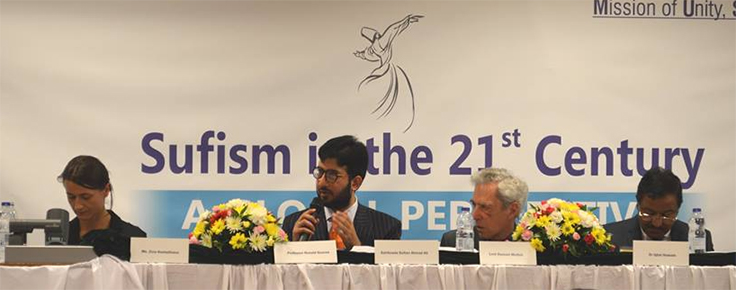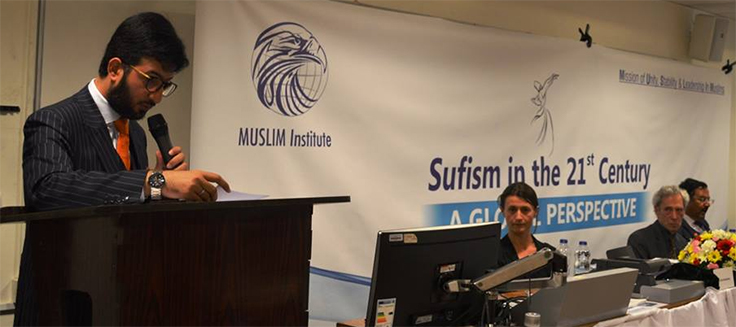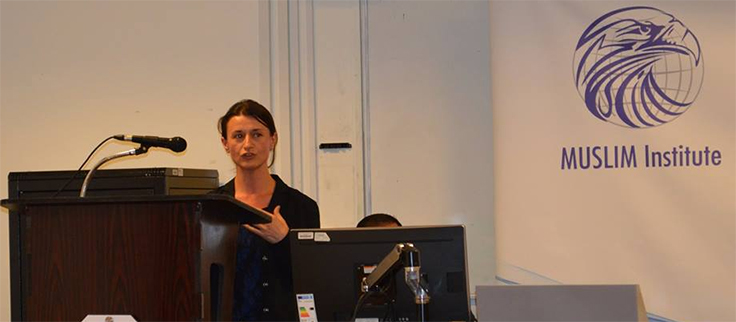| |
|
|
Seminar on
Sufism in 21st Century
A Global Perspective
Organised By
MUSLIM Institute (UK Chapter)
|
|






|
|
MUSLIM Institute – UK Chapter organized a seminar “Sufism in 21st Century: A Global Perspective” on Wednesday September 26, 2018 at Imperial College London, UK. Lord Duncan McNair was guest of honour on the occasion. Sahibzada Sultan Ahmad Ali, Chairman MUSLIM Institute and Ms. Zora Kostadinova from University College London shared their views in the seminar. Dr Iqbal Hussain, President MUSLIM Institute – UK Chapter delivered the welcoming remarks and Barrister Ammar Farooq moderated the proceedings of seminar.
Following deliberations by the speakers were observed in the seminar:
|

From Left: Ms. Zora Kostadinova, Sahibzada Sultan Ahmad Ali, Lord Duncan McNair & Dr Iqbal Hussain.
|
|
Sufism is the true narrative of Islam which is kind, compassionate, merciful and peaceful as demonstrated by the life of Holy Prophet (SAWW). The inclusiveness of Sufism is so universal that it not only includes humanity but the other habitats as well including the environment which has to be preserved and transferred to the future generations in good form. Sufism is egalitarian based on the principles of selfless and service to humanity. Sufism helps in transforming the lives of people from low-self (selfishness, might is right) to high-self (mutual trust, selflessness and respect). Similarly, Sufism opposes extremism and narrow-mindedness and is the way forward to bridge the gap between diverse civilizations.
Sufism, also known as Tasawwuf or Islamic Mysticism, finds its roots in the Holy Quran and the Sunnah of the Holy Prophet (SAWW). As the Chapter Al-A'la, verse 14 states:
“He has certainly succeeded who purifies himself”.
Regarding the primary focus of Sufism that is the purification of the heart or Zuhd, Chapter Ash-Shu'ara, verses 88-89 of the Holy Quran states:
“The Day when there will not benefit [anyone] wealth or children but only one who comes to Allah with a sound heart."
|
|
|
Out of many regions of Asia, when we turn towards Central Asia, a region of vast cultural significance, and a region which has been an important part of the Muslim world, we observe great cultural and historic contribution to Muslim Civilization at large. The heritage of Central Asian literature is also overwhelmingly Sufi in its origin and inspiration. Amongst the four Islamic schools of jurisprudence, or fiqh, i.e. the Maliki, Hanafi, Shafi’i, and Hanbali schools that are named after the four great Imams, we see a thorough ascendency of the Hanafi fiqh in Central Asia. The second aspect, which relates not to jurisprudence but to aqeeda, the dominant system of belief, has been Tassawuf historically which found great popular acceptance in the region. Even today, the people of the region are Hanafi by their adherence to fiqh, and Sufi by system of belief. Till the 19th century, this was not the case for Central Asia only, but of the Muslim World as a whole.
When we turn towards South Asia, Afghanistan is an important country in the region which has been ravaged by war for more than four decades. Yet, the vast majority of Afghans continue to hold an ideological devotion to the Sufi beliefs. It is also a matter of historic fact that Islam was spread in South Asia through the efforts of Sufis, who were native Persian speakers and made their way from Central Asia. This is also a reason Persian literature has such pre-eminence among Muslims and Sufi literature of South Asia to this present day.
|
|
|

Sahibzada Sultan Ahmad Ali sharing his views.
|
|
If we look at Pakistan, since 2005, more than 29 terrorist attacks have been targeted upon Sufi shrines leaving more than 209 martyred and 560 injured. However, Sufis and people affiliated with Tasawwuf still resist terrorism in Pakistan. In the war on terror, two institutions in Pakistan are the leading front, the Armed Forces and the Sufi shrines who have led the campaign to eradicate this menace.
Although the majority of population in Asia comprises of followers of Sufism, yet on the whole Sufi movements have faced severe challenges and difficulties following the wave of terrorism.
Turning towards South-East Asia, we observe a great number of Muslims in the region, especially Indonesia, who believe in Sufism. A great number were historically influenced by Sheikh Ali al-Rinari, a disciple of the great Sufi Sheikh from Multan, Hazrat Bahauddin Zakaria Multani, who preached Islam in what is today Indonesia. Because of Sufis like him, the influence of Sufism can be found in Muslim culture as far as East Asia, including among the Muslims of the Philippines and Malaysia.
On the other side of the Asian continent, and on the cross-roads between Asia and Europe, we find Turkey. A country of great significance in Muslim civilisation and the Sufi tradition. Especially the influence of Mevlana Rumi in Turkey is an illustration of this in itself.
|
|
|
Moving into Europe, we find Sufism in Bosnia which could be kept in two analytical frameworks. One is post-socialism and post-war context. Post socialist in a sense that Bosnia was a part of former Yugoslavian Federation, however, it experienced Sufism in proper way. Kosovo and a part of Serbia also followed traditions of Sufism. When we speak of religious revival in Bosnia, it is about considering broader perspective rather than comparative framework of former Soviet states where religion revived after fall of communism. The other context of Sufism in Bosnia is its Ottoman character. In Yugoslavia this practice was banned therefore these transnational links between Sufi Sheikhs from Bosnia and Turkey were cut off. Sufism was restored as mode of Islamic practice only after 1990s when communism fell. One of the notable consequences of Yugoslavian ban was damage to interaction of ‘Silaasil’ or chain of spiritual knowledge from one Sheikh to another. In Yugoslavia, marginalization of Sufism occurred due to retreat of Ottoman Empire and its replacement with the European Empire. Also due to other challenges, Sufism became marginal. Another consequence of the Yugoslavian ban was the loss of spiritual knowledge.
|
|
|

Lord Duncan McNair sharing his views.
|
|
Sufism holds out the tradition of knowledge in Islam. First word of revelation to Prophet (SAWW) was ‘Iqra’ which means ‘to read’. In Bosnia, the message of modernity and tolerance is carried through the Sufi message. This mainly comes through the idea of being good Muslim. What it means to be a good Muslim. It is very much connected to be hard working in worldly and spiritual issues. Revival of Sufism is partial in Bosnia due to the losses suffered in past. However, Sheikhs are playing important role in Bosnian society at several levels. There is transmission or sharing of transnational cultural knowledge between Turkey and Bosnia, where Turkey is playing quite a big role in restoring the Sufi heritage through building Sufi lodges. It is also sharing researches through translating Sufi literature regarding Rumi and Hafiz. Young people are usually attracted towards Sufism. They consider Sufism a personalized form of faith where they can build relationship with an Islamic figure like a Sheikh who becomes like a fatherly figure to them.
Today, one of the major threats to Sufis and Sufism is from those who classify them as non-believers and target them along with other peoples of different faiths. Second challenge is regarding institutions of Sufi teachings that are not taught in the same way like they were taught in past. Therefore, people sometime tend to think that Sufism is merely a way of earning money or materialistic resources. The spirit of Tassawuf is slowly disappearing. However, there is no denying the fact that people in different parts of the Middle East region, especially Egypt, Morocco and Turkey and also in Pakistan, are doing great work for the revival of Sufi teachings, especially the upbringing of character of oneself.
|
|
|
It may not be wrong to say that challenge regarding quantity of quality has existed throughout history. If you take the example of Imam Al-Qushayri’s “Risala Qusheriya”, one of the most notable historical books on Tassawuf, in the beginning of that book you’ll find a lot of similarities between that time and the present day. Imam Qushayri says that Tassawuf is slowly disappearing. It may be surprising to note that Imam Qushayri is saying this in 5th Century Hijrah. Today it is 15th Century Hijrah and 1,000 years ago Imam Qushayri can be seen saying the same thing that the institutions of Sufism are getting weaker. The problem of quantity of quality has existed throughout the history, nonetheless the quality has in essence survived.
We all want to make our society safe for our future generations. Human rights education can play a very vital role in building tolerant societies. Human rights education is also important in restoring culture of tolerance and decency amongst people. As violation of such rights are carried by individuals therefore there is need to work on “individuals” if we want to build societies with better mutual understanding. Likewise, human rights education and lessons on tolerance, harmony and respect should be a necessary part of the education system.
|
|
|

Ms. Zora Kostadinova sharing her views.
|
| |
|
|
|
|
|
| |
|